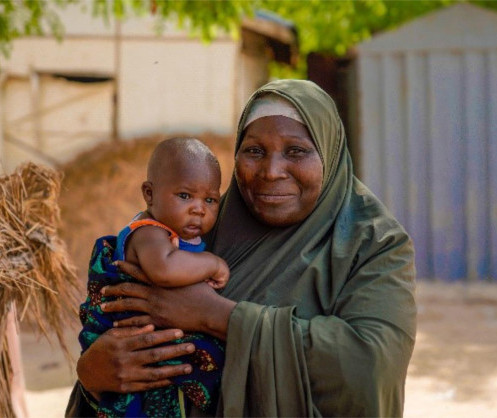Living at the Internally Displaced Persons’ (IDPs) camp in Damagaza in Abuja, 20- years old Anifa Tsani, a mother of one, is glad she can now make informed choices on her sexual and reproductive health.
She started living in the camp at a very young age and married into the same environment where she barely had enough food to eat.
“Anytime I take my child to the health facility for vaccination, the health workers encourage us (caregivers) to space our children through family planning. I decided to use the injection because I want a good life for my child and would like to keep my sexual life private.
The injection availed me the opportunity to protect myself without fear of criticism from my co-wives, and has shielded me from counter-negative cultural perceptions around sexual reproductive health”, she said.
Anifa Tsani’s story is echoed in the stories of many other women who want to have a choice in their sexual and reproductive health.
Reducing stigma and obstacles to care
In Nigeria, there is still low uptake of family planning (FP) services as the 2021 Nigeria Multiple Indicator Cluster Survey (MICS), indicates that the demand for FP services among married or in-union women is only satisfied in 4 out of every 10 women.
To rectify the concerns, the World Health Organization (WHO) has been working with the Federal Ministry of Health (FMOH), using the patient-centred care approach, to provide sexual and reproductive health care services in the country.
This is done through the introduction of self-care interventions at the community level through pharmacy and patent medicine stores and conventional health facilities to reduce the burden of care for health workers.
Speaking on the essence of the approach, the WHO Technical officer, Dr Olumuyiwa Ojo said the initiative is crucial to the country achieving universal health coverage.
Many women now opt for self-care services such as injectable contraceptives
He said WHO works in critical area of supporting policy changes to create an enabling environment for provision of self-care services in the country.
“Following the release of the WHO Self-care guideline in 2019, Government of Nigeria with support from WHO adapted and began implementation of the guideline. It is expected to bridge the gap of unmet need for contraceptives and other selected sexual and reproductive health services.
The support includes coordinated implementation of the costed implementation plan on self-care, leading advocacy, demand generation and creating the enabling policy environment for implementation.
Likewise, WHO through funding from Swedish International Development Agency (SIDA) and the Children Investment Fund Foundation (CIFF) is supporting the government to build the capacity of health workers to provide self-care interventions in Nigeria’s health care services. WHO and other development partners conducted orientation on self-care to health workers and managers in more than 18 states in Nigeria, he said.
Salome Vincent Aya, a health worker and beneficiary of the capacity-building training in Nasarawa State, said the introduction of self-care services into the health system in her locality has boosted women’s wiliness to receive family planning services.
“Many women now opt for self-care services such as injectable contraceptives. It allows those living far from the health facility or who want confidentiality on their reproductive health to have the supplies when needed. It has reduced the cost of transportation, especially, for those living in places far from health facilities.
At first, implementing the initiative raised various concerns from the health workers, but with proper education, they also appreciated it as it reduced the time spent on FP services,” she said.
According to WHO, self-care interventions are tools which support the ability of individuals, families and communities to promote health, prevent disease, maintain health and cope with illness and disability with or without the support of a health worker.
Self-care includes self-management, like administering a long-acting injectable contraceptive or self-swabbing for human papillomavirus, or oral home-testing for HIV. It can include self-awareness, like accessing health information from a trusted peer or an app.
Scaling up Self-care services
To scale up the implementation of self-care services in the country, the FMOH in collaboration with WHO and over 70 partners (including government officials across programs at national and state levels, donors, development partners and private sector players) recently reviewed and planned for the next level of implementation of the national self-care guideline for sexual, reproductive and maternal health.
At the meeting, the Director/Head of Family Health Department, FMOH, Dr Salma Ibrahim Anas- Kolo said self-care initiative is necessary due to the rapid increase in the country’s population and lessons learnt from disruption of services occasioned by the lockdown measures in response to COVID 19 pandemic
Dr Anas-Kolo said the initiative will help to reduce pressure on health facilities to deliver quality care as communities and people are supported to take charge of their own health.
She pointed out that self-care in Nigeria does not equate self-medication, but self-care is limited to some services which has been noted that people could use with or without the support of health workers.
The execution of the self-care services in the country is a backdrop of the earlier launch of the national guideline on self-care alongside the Family Planning 2030 commitment and several other SRH policy documents in March 2022 by the Hon Minister of Health.








OTHER ARTICLES
Editorial — Prevent, inform, and act for women’s health in Africa
Kenya : Government Prioritises Maternal Health and Strengthens Support for Community Health Promoters
Strengthening pandemic prevention, preparedness, and response capacities in Senegal using the “One Health” approach